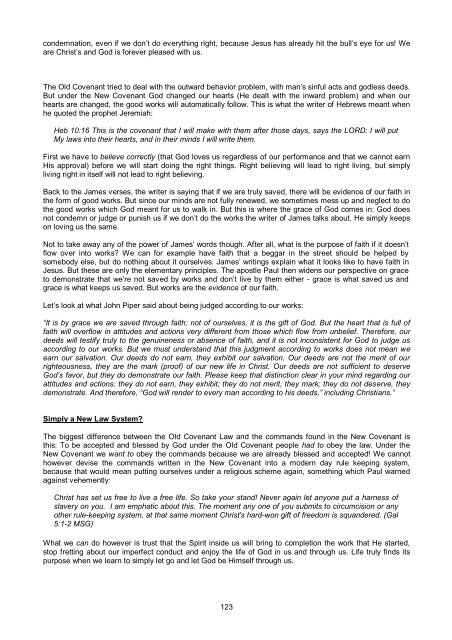Grace, the Forbidden Gospel - Online Christian Library
Grace, the Forbidden Gospel - Online Christian Library
Grace, the Forbidden Gospel - Online Christian Library
Create successful ePaper yourself
Turn your PDF publications into a flip-book with our unique Google optimized e-Paper software.
condemnation, even if we don’t do everything right, because Jesus has already hit <strong>the</strong> bull’s eye for us! We<br />
are Christ’s and God is forever pleased with us.<br />
The Old Covenant tried to deal with <strong>the</strong> outward behavior problem, with man’s sinful acts and godless deeds.<br />
But under <strong>the</strong> New Covenant God changed our hearts (He dealt with <strong>the</strong> inward problem) and when our<br />
hearts are changed, <strong>the</strong> good works will automatically follow. This is what <strong>the</strong> writer of Hebrews meant when<br />
he quoted <strong>the</strong> prophet Jeremiah:<br />
Heb 10:16 This is <strong>the</strong> covenant that I will make with <strong>the</strong>m after those days, says <strong>the</strong> LORD: I will put<br />
My laws into <strong>the</strong>ir hearts, and in <strong>the</strong>ir minds I will write <strong>the</strong>m.<br />
First we have to believe correctly (that God loves us regardless of our performance and that we cannot earn<br />
His approval) before we will start doing <strong>the</strong> right things. Right believing will lead to right living, but simply<br />
living right in itself will not lead to right believing.<br />
Back to <strong>the</strong> James verses, <strong>the</strong> writer is saying that if we are truly saved, <strong>the</strong>re will be evidence of our faith in<br />
<strong>the</strong> form of good works. But since our minds are not fully renewed, we sometimes mess up and neglect to do<br />
<strong>the</strong> good works which God meant for us to walk in. But this is where <strong>the</strong> grace of God comes in: God does<br />
not condemn or judge or punish us if we don’t do <strong>the</strong> works <strong>the</strong> writer of James talks about. He simply keeps<br />
on loving us <strong>the</strong> same.<br />
Not to take away any of <strong>the</strong> power of James’ words though. After all, what is <strong>the</strong> purpose of faith if it doesn’t<br />
flow over into works? We can for example have faith that a beggar in <strong>the</strong> street should be helped by<br />
somebody else, but do nothing about it ourselves. James’ writings explain what it looks like to have faith in<br />
Jesus. But <strong>the</strong>se are only <strong>the</strong> elementary principles. The apostle Paul <strong>the</strong>n widens our perspective on grace<br />
to demonstrate that we’re not saved by works and don’t live by <strong>the</strong>m ei<strong>the</strong>r - grace is what saved us and<br />
grace is what keeps us saved. But works are <strong>the</strong> evidence of our faith.<br />
Let’s look at what John Piper said about being judged according to our works:<br />
“It is by grace we are saved through faith; not of ourselves, it is <strong>the</strong> gift of God. But <strong>the</strong> heart that is full of<br />
faith will overflow in attitudes and actions very different from those which flow from unbelief. Therefore, our<br />
deeds will testify truly to <strong>the</strong> genuineness or absence of faith, and it is not inconsistent for God to judge us<br />
according to our works. But we must understand that this judgment according to works does not mean we<br />
earn our salvation. Our deeds do not earn, <strong>the</strong>y exhibit our salvation. Our deeds are not <strong>the</strong> merit of our<br />
righteousness, <strong>the</strong>y are <strong>the</strong> mark (proof) of our new life in Christ. Our deeds are not sufficient to deserve<br />
God’s favor, but <strong>the</strong>y do demonstrate our faith. Please keep that distinction clear in your mind regarding our<br />
attitudes and actions: <strong>the</strong>y do not earn, <strong>the</strong>y exhibit; <strong>the</strong>y do not merit, <strong>the</strong>y mark; <strong>the</strong>y do not deserve, <strong>the</strong>y<br />
demonstrate. And <strong>the</strong>refore, “God will render to every man according to his deeds,” including <strong>Christian</strong>s.”<br />
Simply a New Law System?<br />
The biggest difference between <strong>the</strong> Old Covenant Law and <strong>the</strong> commands found in <strong>the</strong> New Covenant is<br />
this: To be accepted and blessed by God under <strong>the</strong> Old Covenant people had to obey <strong>the</strong> law. Under <strong>the</strong><br />
New Covenant we want to obey <strong>the</strong> commands because we are already blessed and accepted! We cannot<br />
however devise <strong>the</strong> commands written in <strong>the</strong> New Covenant into a modern day rule keeping system,<br />
because that would mean putting ourselves under a religious scheme again, something which Paul warned<br />
against vehemently:<br />
Christ has set us free to live a free life. So take your stand! Never again let anyone put a harness of<br />
slavery on you. I am emphatic about this. The moment any one of you submits to circumcision or any<br />
o<strong>the</strong>r rule-keeping system, at that same moment Christ's hard-won gift of freedom is squandered. (Gal<br />
5:1-2 MSG)<br />
What we can do however is trust that <strong>the</strong> Spirit inside us will bring to completion <strong>the</strong> work that He started,<br />
stop fretting about our imperfect conduct and enjoy <strong>the</strong> life of God in us and through us. Life truly finds its<br />
purpose when we learn to simply let go and let God be Himself through us.<br />
123

















